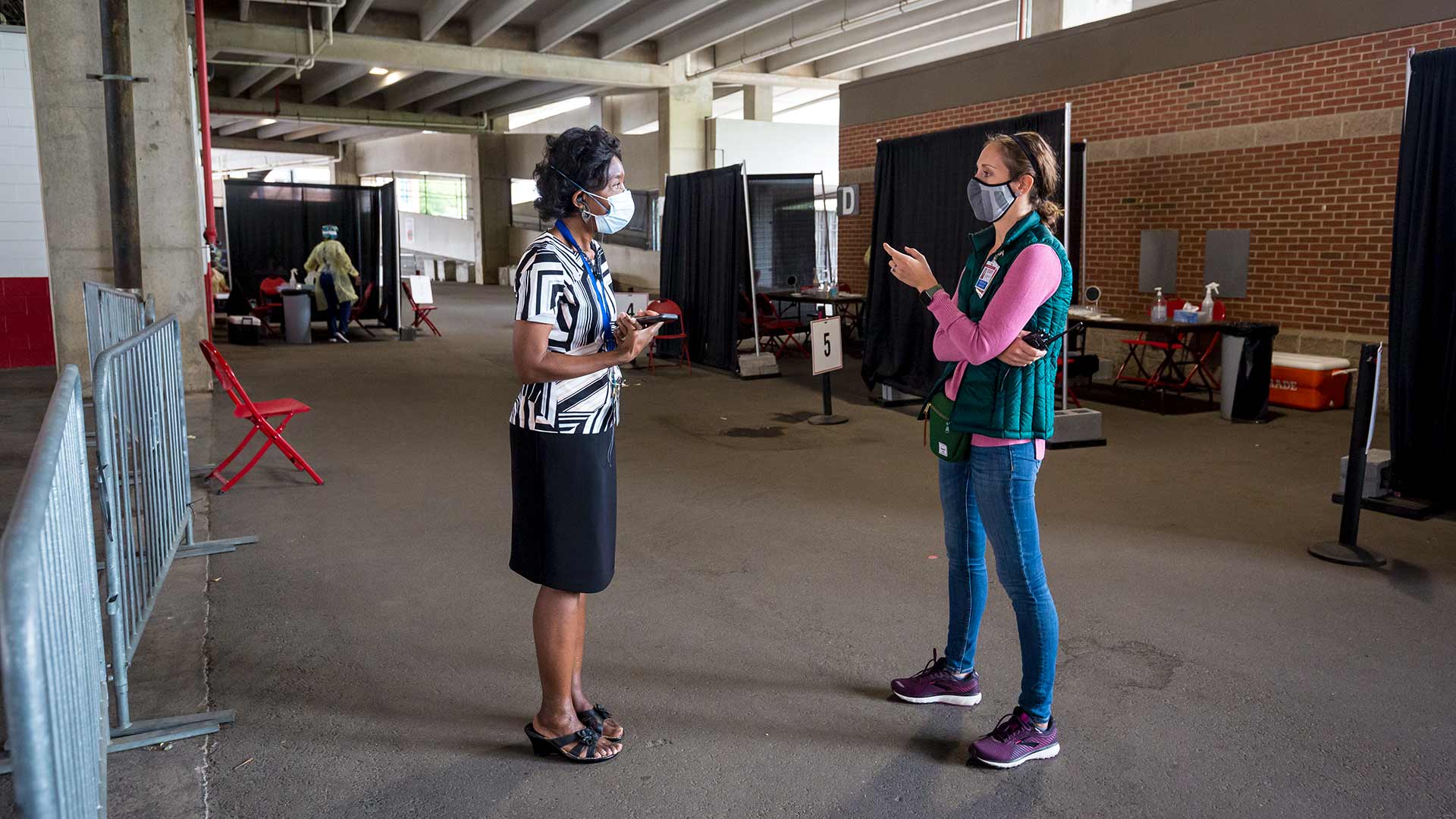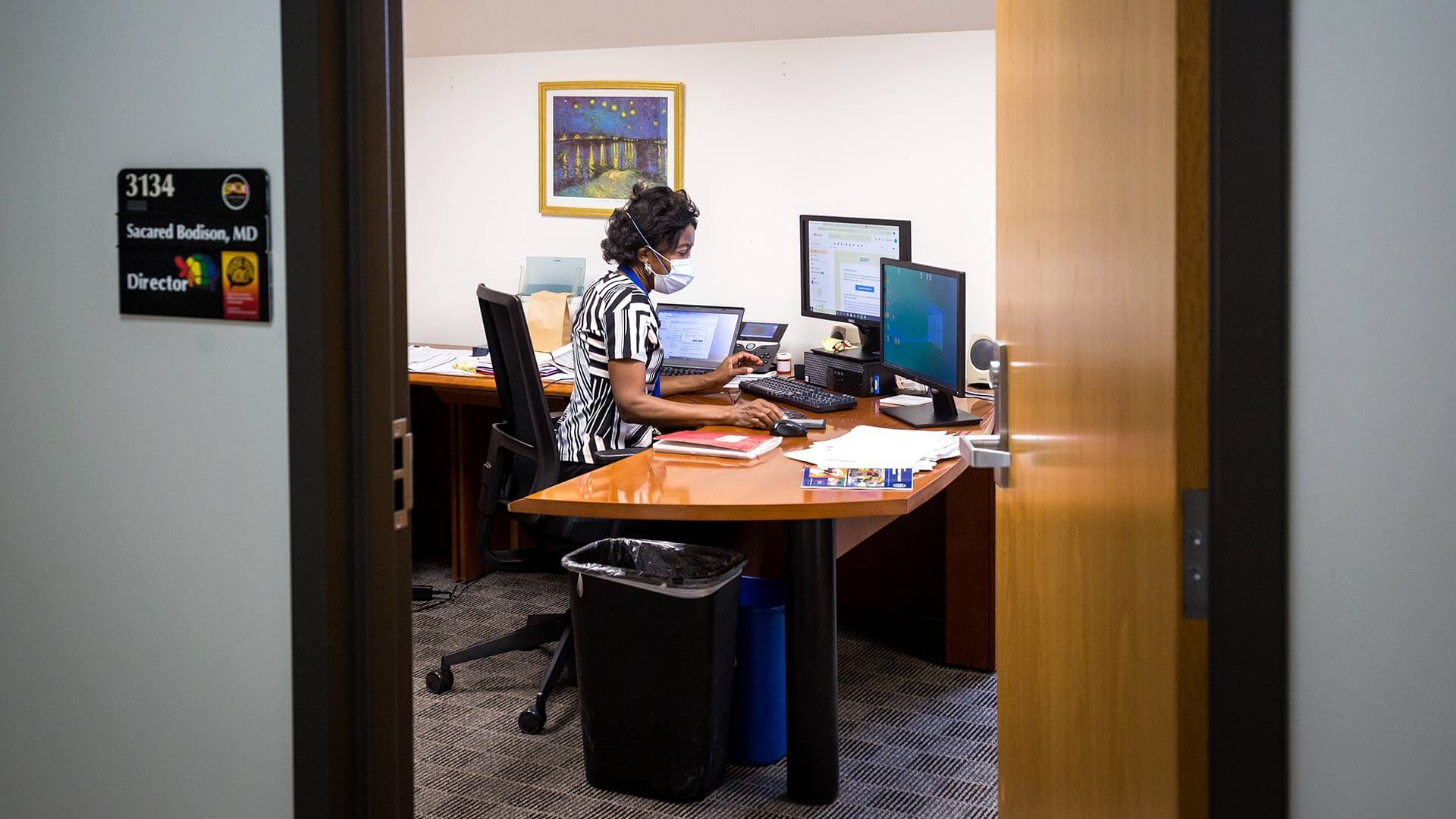- September 29, 2020
- By Annie Krakower
It’s just after 10 a.m., but Dr. Sacared Bodison is already almost four hours into her workday. Now she checks her handwritten notes, dials the phone on her desk, then gently tells a student she’s tested positive for COVID-19.
After asking about her symptoms, contacts and plans for quarantining, Bodison assures her that she’d be happy to speak with her parents, and, yes, she’s already reviewed the results twice, and the coronavirus was definitely detected.
It’s one of several such difficult calls that Bodison, interim director of the University Health Center, makes this Thursday, another day of determined and nearly constant monitoring of the state of COVID-19 on campus that started with checking test results and sending emails and won’t end until after 10 p.m.
As the public face—and voice—of the University of Maryland’s health response, the longtime physician is both working with individual students and their parents and addressing COVID-19 at a macro scale with Prince George’s County and state officials to make complex decisions to keep the campus safe, such as how frequently testing should be held and how to quarantine exposed students.
“It’s a lot of different levels of interaction and responsibility,” she said. “That’s an incredible challenge, but it’s been rewarding to work with a dedicated group of employees, faculty, staff and students determined to try and beat the virus and safely continue to achieve our educational mission.”
Keeping Terps healthy is a familiar undertaking for Bodison, a board-certified pediatrician who previously worked at UMD for nearly 35 years. The University of Buffalo and SUNY Downstate Medical Center College of Medicine grad, who was drawn to the one-on-one interactions of health care, started at Maryland as a staff physician, with stints as a sports medicine doctor, clinical director and, for her last decade, director, before she retired in 2014.
But when her successor, Dr. David McBride, stepped down last October, Health Center staff suggested that UMD reach out to Bodison. She returned to the university to help refocus the team, anticipating the role would only last for a few months. Then COVID-19 hit, exponentially inflating her duties from what was to be a transitional job into a central figure—a general—in UMD’s battle against the novel coronavirus. She’s also caring for her own aged parents, so adding tens of thousands of Terps facing a pandemic to her list of responsibilities wasn’t easy.
“One of the biggest immediate changes was the amount of time I had to commit to the job,” she said. “(There were) many, many, many, many meetings, more planning, working with the staff, working with the division, working with the university, working with the health department.”
So here she is. After a flurry of calls and emails, Bodison heads over to Maryland Stadium to check on the mass testing event taking place. On this day, hundreds of students, faculty and staff had appointments to determine whether they had COVID-19.
 She sometimes works remotely from her home, so whenever she is on campus, she tries to stop by the site—even if it’s just for 10 minutes to drop off supplies, brainstorm or coach the staff through issues or concerns. In a situation that has felt surreal at times, Bodison says, she knows testing is one of our greatest weapons, and she hopes to continue to ramp it up and reduce the turnaround time for confirming results.
She sometimes works remotely from her home, so whenever she is on campus, she tries to stop by the site—even if it’s just for 10 minutes to drop off supplies, brainstorm or coach the staff through issues or concerns. In a situation that has felt surreal at times, Bodison says, she knows testing is one of our greatest weapons, and she hopes to continue to ramp it up and reduce the turnaround time for confirming results.
She strolls down the hill in her modest black heels, a chance for a little exercise on a pleasant afternoon. After fielding a call from the anxious parent of a positive-testing student, she arrives at the stadium to see that the short line is moving quickly.
Since June, the university has been offering free COVID-19 tests in a series of events, with UMD now requiring Terps to confirm a negative result (from an on- or off-campus test) before spending time on campus. During the latest three-week event—which ends Oct. 2 and will be followed by testing for around 1,500 campus community members every Thursday—Bodison instituted observed self-collection, where patients swab their own noses instead of having a staff member do it. This requires one staffer instead of two, allowing for more testing stations to operate at once.
The method has been well received, says Clinical Director Heather Teitelbaum. She greets Bodison with an update before they delve into a series of other topics: the difficulty of addressing positive cases in fraternity and sorority houses, afternoon Zoom meetings about testing protocol and the need to train more staff to answer the HEAL phone line used by those who have symptoms or test positive.
“I’ve seen her really balance some unbelievable challenges,” Teitelbaum says, “between trying to meet the demands of a large university while still protecting the Health Center staff (of more than 100) and making sure that we’re cared for and that we are heard and valued.”
Back in her office, Bodison receives another call, this time from her 94-year-old parents’ caregiver. She’s new, Bodison says, and whenever her mother gives her a hard time, she thinks she’s a failure.
“I keep saying, ‘Nah, nah, that’s just my mother, don’t worry about it,’” Bodison says. Her mother, who has dementia, and her father, a World War II veteran, both still live at their home, something she’s especially thankful for during the pandemic. When the caregiver is off-duty on evenings and weekends, Bodison takes over, adding seemingly endless doctor’s appointments to her already packed schedule.
 She hangs up and pulls her lunch out of a UMD-branded container—green grapes and peanut butter spread on crackers—and eats while joining a Division of Student Affairs Zoom meeting. Colleagues seek her guidance on testing protocols for football players preparing for the start of Big Ten competition next month, antigen-testing equipment concerns for the season, and possible changes to how often Terps must fill out the online symptom-monitoring form.
She hangs up and pulls her lunch out of a UMD-branded container—green grapes and peanut butter spread on crackers—and eats while joining a Division of Student Affairs Zoom meeting. Colleagues seek her guidance on testing protocols for football players preparing for the start of Big Ten competition next month, antigen-testing equipment concerns for the season, and possible changes to how often Terps must fill out the online symptom-monitoring form.
Immediately afterward, she answers a call from a staff member, then dials two people for contact tracing. It’s almost constant communication—she’ll even time her drive home around phone meetings, so she can keep talking and listening while traveling.
“Her incomparable ethic of care, her profound commitment to serve this community and her professional call to lead during a public health crisis have made her the right leader for these times,” said Vice President for Student Affairs Patty Perillo. “We are indebted to her indefatigable call to serve.”
The new Health Center director, Dr. Spyridon Marinopoulos, was named this month and starts in January. But for now, Bodison knows this is what needs to be done to keep the community safe.
“It feels like a war,” she said. “We’re gonna fight. We’re gonna win.”
Topics
PeopleTags
Public Health